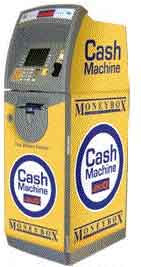News
ISO expansion in the UK
When Tom Hannon founded Hanco ATM Systems, one of the British Isle's first ISOs, in the summer of 2000, the ATM veteran said he intended to use the UK as a 'springboard' into other European countries. Now Hanco and several of the UK's other independents are signaling their intentions to test other European markets.
November 20, 2002
When Tom Hannon founded Hanco ATM Systems, one of the British Isle's first ISOs, in the summer of 2000, the ATM veteran said he intended to use the UK as a "springboard" into other European countries.
Now Hanco and several of the UK's other independents are signaling their intentions to test other European markets.
Dominic Hirsch, managing director of the UK's Retail Banking Research Ltd (RBR), thinks that at least a few of the UK's independent deployers may be able to successfully make the leap.
"It's not so much a matter of whether as when," Hirsch said. "I believe that several of the UK's major players will be able to move into other countries, but I'm not sure it will be as quickly as they might like."
Distinct cultural differences and the lack of a common language across the continent will mean that UK deployment models "are not totally transferable" to other European countries, Hirsch said. "It's not as simple as in the U.S., where ISOs can move their business from state to state with relatively few problems."
Yet because of their experience in the UK, Hirsch said British ISOs enjoy several advantages, including an understanding of how to handle retailers, as well as more familiarity with service requirements and other aspects of a successful ATM program.
According to RBR's 2002 report on the European market, Europe's installed base of ATMs expanded by 6 percent, or almost 15,000 machines, during 2001. Germany, the region's largest ATM market since 1993, has almost 50,000 machines. Spain is in second place with just under 47,000 installations, while France, the UK and Italy each have between 34,000 and 37,000 ATMs.
A majority of 2001's new installations, 88 percent, were in the continent's "Big Five" -- Germany, Spain, France, the UK and Italy. The UK market alone was responsible for three out of every 10 machines, due to its adoption of surcharging and the resulting increase in ISO deployments, Hirsch said.
Picking a place
A real challenge will be identifying which countries offer the best opportunities for expansion, Hirsch said. For instance, Spain seems like a likely candidate -- until one looks at the country's ATM density. Hirsch said Spain has 1,174 ATMs for every million people -- not far behind the crowded 1,229 ATMs per million in North America and far ahead of the European average of 585 ATMs per million.
"Of course, the counter argument is that not a lot of ATMs are found in places like bars and clubs, but still that's a very high density," Hirsch said. "So you may find yourself expending quite a lot of effort for an opportunity that may not amount to more than a few thousand machines."
 |
UK-based ISO Moneybox wants to put ATMs like this across Europe. The company has already entered the Netherlands and plans to be in Germany soon. |
Mark Mills, chief executive of UK-based ISO Cardpoint, is not deterred by Spain's overall number of ATMs or its ATM density -- but by the large number of bank branches found there. Indeed, RBR's 2002 report mentions an "overprovision of branches" in Spain.
"Even though the number of machines per capita is high, the number of off-premise machines is low; that's quite similar to the UK a few years back," Mills said. "But you've got lots and lots of banks; that could suffocate the ISO market before it even begins."
Few European countries allow surcharging, which was the main catalyst for retail ATM deployment in the UK, as well the U.S. and Canada. "If you're not going to surcharge, you have to base your model on interchange alone," Hirsch said.
Making a move
Surcharging may have been one reason that Moneybox, which owns the majority of its 2,000 machines in the UK, recently entered the Netherlands. According to Paul Stanley, Moneybox's managing director, the Netherlands allows an acquirer to collect a convenience fee at the ATM. Moneybox is levying a fee of Euro 1.59 (about $1.60 U.S.) at its ATMs there.
In the past few months, Moneybox has installed about 100 machines bearing a brand called "Flappentap" (a Dutch slang term for an ATM that translates roughly as "bill pump," according to Stanley) at sites including hotels and gas stations. The company recently announced a deal to deploy 50 ATMs at McDonald's restaurants.
Stanley said Moneybox hopes to have 750 machines in the Netherlands by the end of 2003.
The Netherlands is a country that satisfies all of Stanley's criteria for a promising ATM market: universal ATM reciprocity; a population familiar with ATMs; a high percentage of cash transactions; a single network or switch that oversees all ATM transactions (Interpay); and a strong local bank partner (SNS Bank).
"We'd like to expand into all countries where these criteria are present," Stanley said. "Scale is absolutely critical in this business. You can't be a small deployer and make any money at it."
Yet Cardpoint's Mills isn't convinced that economies of scale can be achieved when borders are crossed and new investments in infrastructure are required. "I suspect you're not going to get the incumbent economies of scale from your UK business when you have to start fresh."
Next stop, Germany
According to Stanley, the next country Moneybox will move into is Germany. The company plans to install 100 ATMs by year's end, and Stanley said Moneybox expects to have as many as 2,000 machines there by the end of 2003.
In Germany, Moneybox's partner is Service Bank, a wholly owned subsidiary of GE Capital. While Germany does not allow acquirers to collect direct fees for offering access to cash at the ATM, it does have a generous interchange structure, Stanley said.
Hirsch speculated that Cardpoint's recent purchase of 400 ATMs from Wincor Nixdorf, the dominant manufacturer in its native Germany, may be a sign of Cardpoint's interest in that country.
"Let somebody else crack the system but not get all the good customers. Then we roll in behind and pick up good customers and transactions at a lower cost of entry." |
However, Mills said his company is still "quite happy" with the UK. "It's nowhere near saturated. We're using the vast majority of funds we've just raised to fulfill our current customer requests." (Cardpoint listed on the UK's Alternative Investment Market last June.)
Like Stanley, Terry Turner of Hanco ATM Systems finds the Netherlands attractive because of its single switch (Interpay). "If you put an ATM into a country, it's got to accept all cards. If it doesn't, you've already got a struggle on your hands," said Turner, Hanco's managing director.
Turner said his company hired a country director for the Republic of Ireland (Brian Mahony) in March and plans to do so soon in the Netherlands.
Details, details
He stressed that Hanco, which has about 2,500 mostly merchant-owned ATMs under contract in the UK, is in "the very early stages" of expansion. "The devil is always in the details," he said.
Lining up a financial institution for the required sponsorship into ATM networks is one detail that is proving a little devilish for Hanco. It wasn't necessary to obtain sponsorship in the UK, as that country's LINK network offers a direct connection to independents.
"It's a real Catch 22," Turner said. "You've got to get a bank to be successful, but you've got to be successful to get a bank to look at you."
Turner said the task is made a little easier because of Hanco's high-profile deal to place machines in British Post Office branches, announced earlier this year.
"It took us two years to do that deal, but it's really paid off because we've been getting a lot more interest in the other countries where we've been talking to people," Turner said. "It's almost like an endorsement from the government."
Cardpoint's Mills prefers to let his competitors make the first moves into other countries.
"I like what I call the second mover advantage," Mills said. "Let somebody else crack the system but not get all the good customers. Then we roll in behind and pick up good customers and transactions at a lower cost of entry."
All of the UK's independents seem to agree that international expansion is not easy -- even on a continent as contained as Europe.
"Each country is a unique learning experience," said Moneybox's Stanley. "You have to invest plenty of time and effort before you can even start talking to people, much less landing any business."
"You can lose an awful lot of money if you do it incorrectly," Turner said.
 ChatGPT
ChatGPT Grok
Grok Perplexity
Perplexity Claude
Claude












